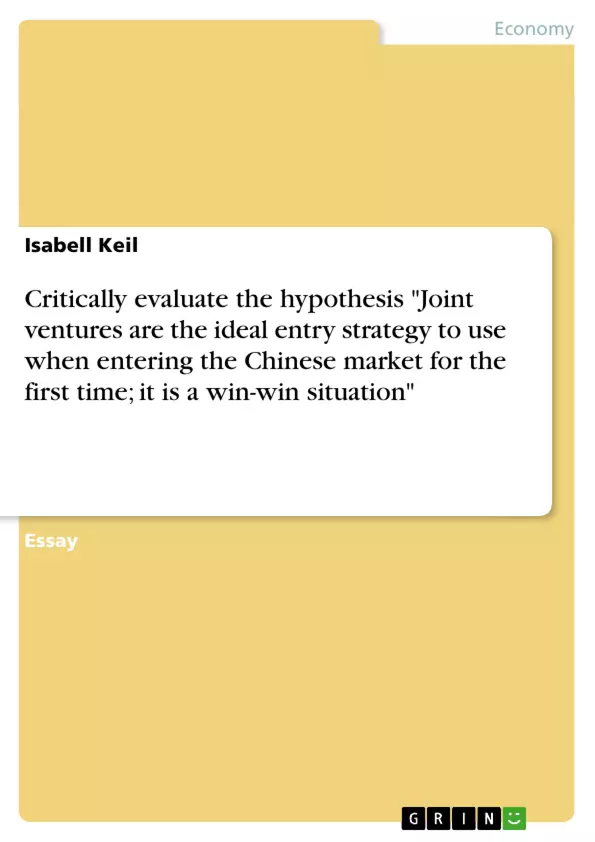The People’s Republic of China (PRC) is the last Communist State in the world (Roberts and Kynge, 2003). Mao Zedong, the leader from 1949 until 1976, pursued a radical politicsorientated and self-sustained policy, which “had China’s door closed in front of the foreign countries” (Yahoo! Inc., 2003). Deng Xiaoping succeeded Mao Zedong and launched his economic reform programme, called the “Open Door” policy, in 1978, which encouraged foreign investment (Yahoo! Inc., 2003). This was the beginning of a new era for China. A great deal of international investors tried to gain a foothold in China’s fast growing markets in the form of joint ventures or direct investment.
This paper is devoted to the joint venture (JV), and investigates whether or not this form of enterprise is the ideal strategy to enter the Chinese market. After a short survey of the Chinese economy, JV’s will be defined. The explanation of JV’s is made under consideration of the distinctive features of the Chinese culture. A lot of enterprises and JV’s as well failed because it is not easy to deal with the Chinese. This essay reports about failures of a Western JV and tries to examine the causes. Examples of successful JV’s are described as well before concluding whether or not “Joint ventures are the ideal entry strategy to use when entering the Chinese market for the first time; it is a win-win situation”.
Inhaltsverzeichnis (Table of Contents)
- Introduction
- The Chinese Economy
- Deng Xiaoping's Reforms
- Economic Growth and Challenges
- Joint Ventures
- Definition and Types of Joint Ventures
- Advantages and Disadvantages of Joint Ventures
- Joint Ventures in the PRC
- Government Involvement
- Implementation Challenges
- Legal Framework
- Cultural Considerations
- Confucian Values and Management Behaviour
- Case Study: PepsiCo Inc.
- Problems and Solutions
- Conclusion
Zielsetzung und Themenschwerpunkte (Objectives and Key Themes)
This paper critically examines the hypothesis that joint ventures are the ideal entry strategy for foreign companies entering the Chinese market. The study analyzes the Chinese economy and the role of joint ventures in its development. The paper explores the advantages and disadvantages of joint ventures in the Chinese context, particularly focusing on cultural considerations and the challenges faced by foreign companies.
- The impact of Deng Xiaoping's economic reforms on China's growth and development.
- The role of joint ventures in foreign market entry strategies, particularly in developing countries.
- The unique characteristics of joint ventures in the PRC, including government involvement and cultural considerations.
- The challenges and opportunities associated with establishing and managing joint ventures in China.
- The importance of cultural understanding and trust in successful joint venture partnerships.
Zusammenfassung der Kapitel (Chapter Summaries)
- Introduction: This chapter introduces the hypothesis that joint ventures are the ideal entry strategy for the Chinese market and provides an overview of the paper's structure and focus.
- The Chinese Economy: This chapter discusses the evolution of the Chinese economy since Deng Xiaoping's economic reforms, highlighting the country's rapid growth and challenges.
- Joint Ventures: This chapter defines joint ventures and explores their advantages and disadvantages. It examines different types of joint ventures and discusses the unique characteristics of joint ventures in the PRC.
- Cultural Considerations: This chapter analyzes the impact of Confucian values on Chinese business practices and explores how these values can influence the success of joint ventures.
- Case Study: PepsiCo Inc.: This chapter presents a case study of PepsiCo's joint venture in China, highlighting the challenges and complexities of managing a joint venture in the PRC.
- Problems and Solutions: This chapter identifies common problems faced by foreign companies in joint ventures with Chinese partners, and explores potential solutions and strategies for success.
Schlüsselwörter (Keywords)
This paper explores the key topics of international business, export management, joint ventures, China, foreign investment, cultural considerations, and the challenges and opportunities of entering the Chinese market. The study examines the unique characteristics of the Chinese economy and business environment, focusing on the role of government involvement, Confucian values, and trust in successful joint venture partnerships.
Frequently Asked Questions
Are Joint Ventures the ideal strategy to enter the Chinese market?
While Joint Ventures (JVs) offer benefits like local knowledge and government ties, they are complex and often fail due to cultural differences and management conflicts.
What was the "Open Door" policy in China?
Launched by Deng Xiaoping in 1978, the "Open Door" policy initiated economic reforms that encouraged foreign investment and ended China's self-sustained isolation.
What role does Confucianism play in Chinese business?
Confucian values emphasize hierarchy, collectivism, and personal relationships (Guanxi), which significantly influence management behavior and partnership dynamics.
Why did many Western Joint Ventures in China fail?
Failures were often caused by legal framework challenges, government involvement, lack of trust, and a failure to adapt to distinctive Chinese cultural norms.
What are the main advantages of a Joint Venture in the PRC?
Advantages include easier access to local distribution networks, navigating government regulations, and sharing the risks of entering a fast-growing but volatile market.
- Quote paper
- Isabell Keil (Author), 2003, Critically evaluate the hypothesis "Joint ventures are the ideal entry strategy to use when entering the Chinese market for the first time; it is a win-win situation", Munich, GRIN Verlag, https://www.grin.com/document/28897



